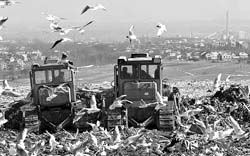Thief in nature’s temple
Air pollution on the rise in Ukraine
It is dangerous to pull the tail of such a generally docile animal as a domestic cat. But playing cat and mouse with mighty nature and even scattering all kinds of poisonous wastes on its supposedly hallowed territory is considered quite a normal thing.
How did we get this way? Perhaps we are influenced by the words of the classical theorist, who said that nature is a workshop in which man is the chief (a poor one by all accounts) or the words of a no less famous practical scientist, who maintained that we should not wait for nature to show mercy — our task is to harness it.
We did harness it. At a recent session of the Ministry of Environmental Protection it was announced that air pollution rose in 21 regions of Ukraine in 2006 and that 70 percent of our water surface is polluted. According to environmentalists, all sectors of nature management in Ukraine show deterioration. Last year stationary sources alone accounted for about 4.5 million tons of air pollutants.
Uncontrolled toxic emissions have led not only to the contamination of surface springs but also to the loss of large underground water reserves that can no longer be used as sources of potable water. This is also the result of a catastrophic accumulation of household and industrial wastes. There are about 35 billion tons in Ukraine, occupying an area of 130,000 hectares.
What is going on? Why did the ministry suddenly sound the alarm? When the current presidential chief of staff, Baloha, was the environment minister, he didn’t say a word. But this is not a question of personalities but the fact that both the ecology and the economy are upset in Ukraine. The economy behaves like a robber and poisoner and does not deem it necessary to make up for the damage done to nature.
One factor is the economic slump and closed or partially functioning businesses. Over the past few years nature has managed to take a breather after the Soviet Five-Year Plans and the pursuit of capitalism. We never caught up with the latter but almost brought the environment down. But as First Vice-Premier and Finance Minister Mykola Azarov announced recently, Ukraine reached the 1990 level of industrial output in 2006 and is going to achieve that year’s GDP by mid-2008. Now it is clear where gas pollution, liquid, solid and other wastes, poisonous to nature and man, are coming from.
The Ministry of Environmental Protection believes that the way out of this situation is a new ecological strategy and concept of public administration, which would take into account modern environmental requirements for human activities and all industrial facilities, and become part of the main state economic programs.
The idea is good, no doubt about it. The only question is how to put it into practice. Obviously, the importance of these strategies and concepts should be reflected in the fundamental documents that guide the national economy, like a yearly or longer-term program of socioeconomic development and a budget based on the former. Alas, while the budget has been adopted, the 2007 program is still in the hands of the Parliamentary Committee for the Economy. By all accounts, political brawls are more important than this “trifle.”
Nor is it clear what will happen to the long-term strategic program of socioeconomic development now being mapped out by the cabinet for the first time in the history of Ukraine. Will it have chapters calling not just for papering over the cracks on the tender body of nature but for undertaking serious efforts to protect it from the encroachments of an unqualified and foolish master, who only thinks about today?
Meanwhile, the central government continues to field queries from the provinces. Even Kyiv’s problems with dumpsites that are about to discharge their contents into nearby rivers pale in comparison. For example, the potassium plant owned by the Oriana Company of Kalush — a city already full of chemical businesses — represents a danger to human health and life. It is doing irreparable harm to the environment, causing ground depression and salinity, as well as the formation of craters. There have already been 12 cave-ins, and the ground surface has been sagging at a rate of 100 mm a year for the past three years.
In addition, the tailings dam is on the verge of ruin, while brines have reached a dangerous mark of tens of millions of cubic meters. The government must find the funds to patch this gaping hole. The problem is that this country has not yet found a critical mass of intelligent individuals (true nature keepers) who would focus on creating a reliable environmental protection system.






